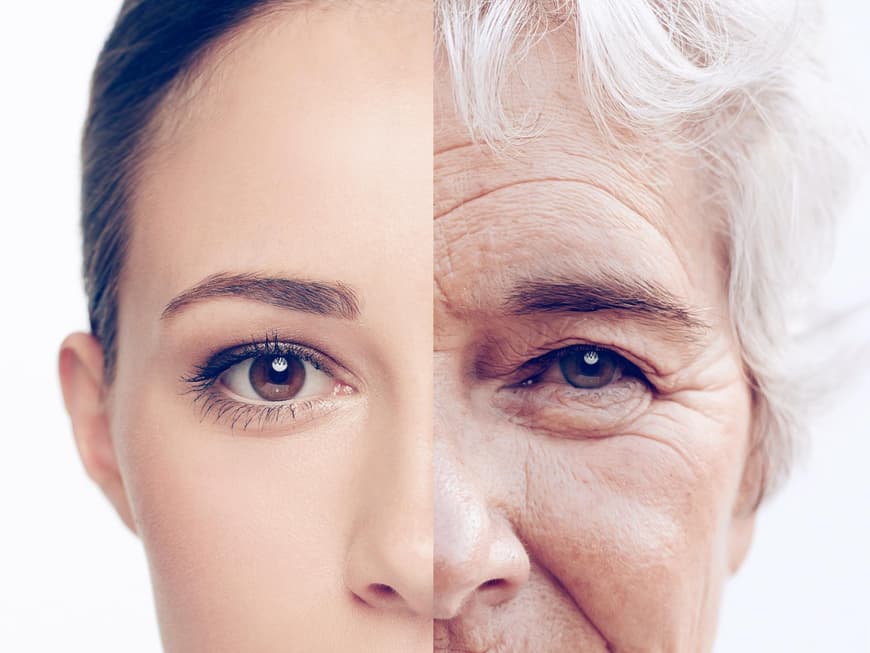
Throughout our lives, our cells die and renew themselves, some take years, others just a few days. But why is this so? What are the reasons behind our transience? Why do we age? Dr. Kai-Michael Beeh explains the latest research findings.
When does our ageing process actually begin?
"From the age of 35, muscle strength decreases, vision weakens - around the age of 40, presbyopia begins and we get our first gray hairs."
What causes cells to die at some point?
"Every cell has its own programmed cell death. This means that it dies when it gets old and can no longer repair itself. Environmental factors such as too much sun, nicotine and other toxins also contribute to this. Smokers, for example, age a third faster. You should therefore avoid these external factors."
Is there any purpose to this process?
"For around 40 years, the body builds itself up perfectly and runs like clockwork. And then it ages. The theory is that all the energy goes into reproduction. As soon as humans have children, it is no longer necessary to keep the apparatus running; the extremely complicated repair mechanisms of the cells no longer function properly. We have to make room for our offspring. Evolution did not plan for us to grow so old. You also have to bear in mind that 150 years ago, the life expectancy of a German was 35 to 40 years. They died of illness, had an accident or were fatally injured in a war. We call that catastrophic death."
Some people live to an extremely old age ...
"Yes, that's true. We assume that 20 percent of ageing is determined by genes and 80 percent by the environment. Some people have protective mechanisms in their lungs, for example - like Helmut Schmidt, who smoked a lot. Others don't and then get lung cancer."
Is there such a thing as a maximum lifespan?
"Today, we assume that it is 120 to 124 years - then, unfortunately, it's over for good."
Can we do anything about ageing?
"No, we have to age, that's a given - but we can do it healthily. That means: muscle and endurance training, a sensible diet and enough sleep. Masses of hormones and messenger substances are produced in the muscles. Colon cancer, for example, can be slowed down by these messenger substances from the muscles. But you don't have to do three hours of sport every day. I always say: anything is better than nothing. 15 minutes of exercise a day is enough."
Women live longer ... but they (unfortunately) age faster
Hormones: After the menopause, women's sex hormone levels drop rapidly. As a result, they age quickly during this period. In men, on the other hand, testosterone levels only fall very slowly and they do not experience the physically striking menopause.
Reproduction: After the menopause, women can no longer have children - but men can still conceive. According to the researchers, this may also be one of the reasons why men do not age physically as quickly, as they have to remain attractive to women of childbearing age. Senior men are usually physically fitter and more capable than their female counterparts. Men's responsiveness declines later, and five out of six age-related eye diseases occur later in men than in women. But here's the big problem: they die much earlier.
Longer life: Women in Germany age faster - but they live longer: on average, they live five years longer than men. It is not entirely clear why this is the case - experts suspect that lifestyle also plays a major role. This is because the remaining testosterone encourages reckless driving and an unhealthy lifestyle - which shortens life expectancy. In addition, testosterone weakens the immune system and makes men more susceptible. On average, a woman in Germany can expect to live 83 years, a man only 78.
One more chromosome: Biologically, women already have an advantage because they have a double X chromosome. Researchers at Ghent University have discovered that this chromosome contains many hereditary traits and cell copies that are extremely important for the immune system. If a woman's X chromosome is defective, it can be compensated for by the second, still intact version. This mechanism does not work in men, as their genetic material contains a Y chromosome instead of the X copy.
